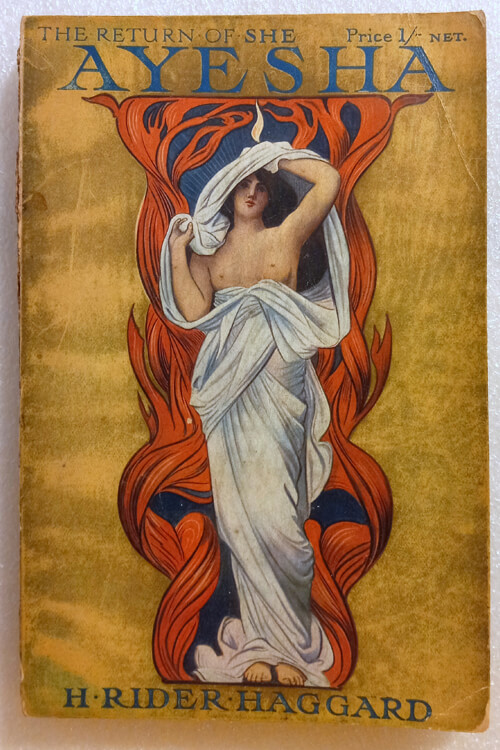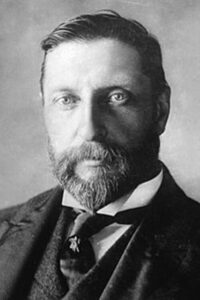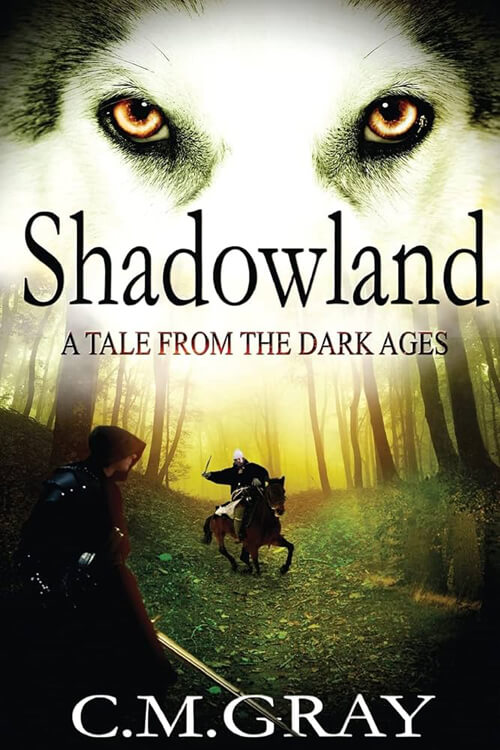
Ayesha, The Return of She
Verily and indeed, it is the unexpected that happens! Probably if there was one person upon the earth from whom the Editor of this, and a certain previous history, did not expect to hear again, that person was Ludwig Horace Holly. This, too, for a good reason; he believed him to have taken his departure from the earth. When Mr. Holly last wrote, many, many years ago, it was to transmit the manuscript of She, and to announce that he and his ward, Leo Vincey, the beloved of the divine Ayesha, were about to travel to Central Asia in the hope, I suppose, that there she would fulfill her promise and appear to them again.
Often I have wondered, idly enough, what happened to them there; whether they were dead, or perhaps droning their lives away as monks in some Tibetan Lamasery, or studying magic and practicing asceticism under the tuition of the Eastern Masters trusting that thus they would build a bridge by which they might pass to the side of their adored Immortal. Now at length, when I had not thought of them for months, without a single warning sign, out of the blue as it were, comes the answer to these wonderings!
To think—only to think—that I, the Editor aforesaid, from its appearance suspecting something quite familiar and without interest, pushed aside that dingy, unregistered, brown-paper parcel directed in an unknown hand, and for two whole days let it lie forgotten. Indeed there it might be lying now, had not another person been moved to curiosity, and opening it, found a bundle of manuscript badly burned upon the back, and with this two letters addressed to myself.
Although so great a time had passed since I saw it, and it was shaky now because of the author’s age or sickness, I knew the writing at once—nobody ever made an “H” with that peculiar twirl under it except Mr. Holly. I tore open the sealed envelope, and sure enough the first thing my eye fell upon was the signature, L. H. Holly. It is long since I read anything so eagerly as I did that letter. Here it is:—
“My dear sir,—I have ascertained that you still live, and strange to say I still live also—for a little while.
“As soon as I came into touch with civilization again I found a copy of your book She, or rather of my book, and read it—first of all in a Hindustani translation. My host—he was a minister of some religious body, a man of worthy but prosaic mind—expressed surprise that a ‘wild romance’ should absorb me so much. I answered that those who have wide experience of the hard facts of life often find interest in romance. Had he known what were the hard facts to which I alluded, I wonder what that excellent person would have said?
“I see that you carried out your part of the business well and faithfully. Every instruction has been obeyed, nothing has been added or taken away. Therefore, to you, to whom some twenty years ago I entrusted the beginning of the history, I wish to entrust its end also. You were the first to learn of She-Who-Must-Be-Obeyed, who from century to century sat alone, clothed with unchanging loveliness in the sepulchers of Kor, waiting till her lost love was born again, and Destiny brought him back to her.
“It is right, therefore, that you should be the first to learn also of Ayesha, Hesea, and Spirit of the Mountain, the priestess of that Oracle which since the time of Alexander the Great has reigned between the flaming pillars in the Sanctuary, the last holder of the scepter of Hes or Isis upon the earth. It is right also that to you first among men I should reveal the mystic consummation of the wondrous tragedy which began at Kor, or perchance far earlier in Egypt and elsewhere.
Read or download Book
H. Rider Haggard
Sir Henry Rider Haggard KBE (22 June 1856 – 14 May 1925) was an English writer of adventure fiction romances set in exotic locations, predominantly Africa, and a pioneer of the lost world literary genre. He was also involved in land reform throughout the British Empire. His stories, situated at the lighter end of Victorian literature, continue to be popular and influential.
Life and career
Family
Henry Rider Haggard, generally known as H. Rider Haggard or Rider Haggard, was born at Bradenham, Norfolk, the eighth of ten children, to William Meybohm Rider Haggard, a barrister, and Ella Doveton, an author and poet. His father was born in Saint Petersburg, Russia, in 1817 to British parents.
A member of the Haggard family, he was the great-nephew of the ecclesiastical lawyer John Haggard an uncle of the naval officer Admiral Sir Vernon Haggard and the diplomat Sir Godfrey Haggard.
Education
Haggard was initially sent to Garsington Rectory in Oxfordshire to study under Reverend H. J. Graham, but, unlike his elder brothers, who graduated from various private schools, he attended Ipswich Grammar School. This was because his father, who perhaps regarded him as somebody who was not going to amount to much, could no longer afford to maintain his expensive private education. After failing his army entrance exam, he was sent to a private crammer in London to prepare for the entrance exam for the British Foreign Office, where he never sat. During his two years in London, he came into contact with people interested in the study of psychic phenomena.
Writing career
After returning to England in 1882, Haggard published a book on the political situation in South Africa, as well as a handful of unsuccessful novels, before writing the book for which he is most famous, King Solomon’s Mines. He accepted a 10 percent royalty rather than £100 for the copyright.
A sequel soon followed entitled Allan Quatermain, followed by She and its sequel Ayesha, swashbuckling adventure novels set in the context of the Scramble for Africa (although the action of Ayesha happens in Tibet). The hugely popular King Solomon’s Mines is sometimes considered the first of the Lost World genre. She is generally considered to be one of the classics of imaginative literature, and with 83 million copies sold by 1965, it is one of the best-selling books in history. He is also remembered for Nada the Lily (a tale of adventure among the Zulus) and the epic Viking romance, Eric Brighteyes.
Legacy
Psychoanalyst Carl Jung considered Ayesha, the female protagonist of She, to be a manifestation of the anima. Her epithet “She Who Must Be Obeyed” is used by British author John Mortimer in his Rumpole of the Bailey series as the lead character’s private name for his wife, Hilda, before whom he trembles at home (even though he is a barrister with some skill in court). Haggard’s Lost World genre influenced popular American pulp writers such as Edgar Rice Burroughs, Robert E. Howard, Talbot Mundy, Philip José Farmer, and Abraham Merritt. Allan Quatermain, the adventure hero of King Solomon’s Mines and its sequel Allan Quatermain, was a template for the American character Indiana Jones. Quatermain has gained recent popularity thanks to being a main character in the League of Extraordinary Gentlemen.
Graham Greene, in an essay about Haggard, stated, “Enchantment is just what this writer exercised; he fixed pictures in our minds that thirty years have been unable to wear away.” Haggard was praised in 1965 by Roger Lancelyn Green, one of the Oxford Inklings, as a writer of a consistently high level of “literary skill and sheer imaginative power” and a co-originator with Robert Louis Stevenson of the Age of the Story Tellers.






